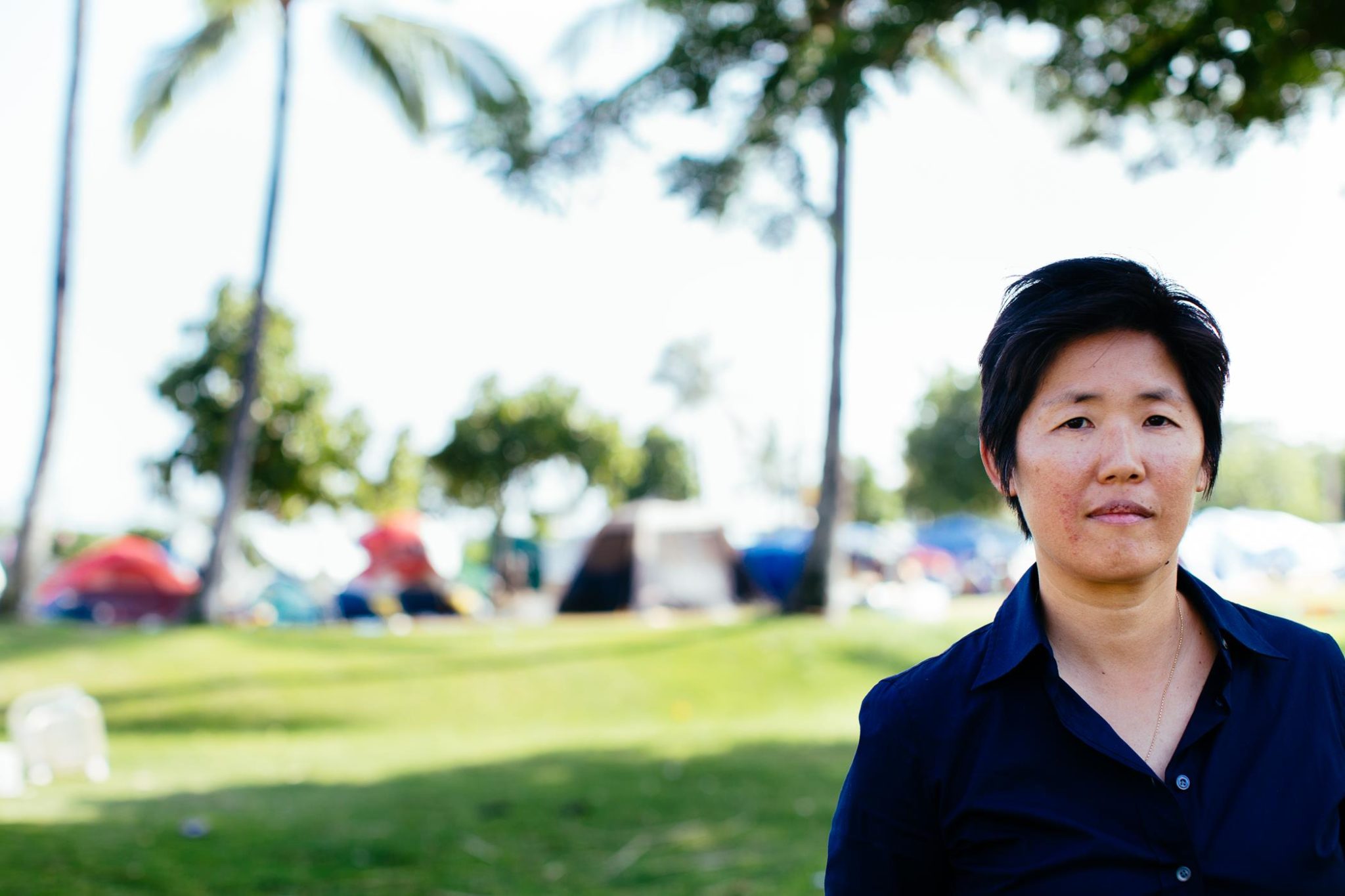For Honolulu-based human rights activist Kathryn Xian, making soap is only the newest endeavor in an ongoing career empowering houseless communities and fighting against sex trafficking.
Text by Kelli Gratz | Image by Jonas Maon
It’s 3 p.m. in Kaka‘ako, an emerging arts mecca in Honolulu, and Kathryn Xian has just spent the day handing out soap to the houseless community there, talking story and providing insight into available resources and support. While it seems she is merely giving away bars of soap, she’s also identifying and helping families most at risk of sexual abuse and trafficking. “In Hawaiian, ‘pono’ means well-being, goodness, and welfare,” she says. “Pono Soap aims to establish housing subsidies for these families to help them find a home and keep it.” This creation is her newest adventure, which she and her wife concocted just last year. But it’s far from the start of her work as a human rights activist, which has ranged from producing award-winning films under her filmmaking company Zang Pictures, Inc.; to mentoring LGBT high school students; to heading yearly anti-violence festivals (Girl Fest Hawaii). This is not to mention the list of nonprofits she’s either founded or partnered with over the years (Equality Now, Pacific Alliance to Stop Slavery, Rape-Free Zone Coalition).
Her sharp black hair, hopeful smile, and effervescent energy stand out like a bubbly drink in a sea of brine. For more than a decade, Xian’s whip-smart and passionate presence has permeated the island community, resulting in several successful milestones including the signing of Act 82, the first law in the nation to outlaw sex-tourism, and the passing of Hawai‘i’s first anti-sex-trafficking state law, SB265, in late April. Xian describes how it’s been: “I’m an activist through and through,” she says. “Every single thing I dive into has no single purpose. Whether I’m out on the picket line or inside a classroom, the goal is the same: making a positive impact in the lives of those in need.”
Xian didn’t set out to become a public advocate, but struggles she experienced while growing up primed her for the field. Raised by her grandparents in Pupukea while her single mom worked to finish college, then moving forth between the two, Xian was the target of anti-gay bullying while she was a student at Mid-Pacific Institute. She eventually dropped out, and received her GED before heading to Bard College in New York City. “It was a tough time,” Xian says. “But it motivated me to address political and social concerns within the community, and work to create safe environments for Hawai‘i’s youth.”
While in New York, Xian did a brief stint studying film at New York University —just enough to get the momentum going before transferring to Arizona State University, where she got a bachelor’s degree in Justice Studies. With this under her belt, Xian founded her own filmmaking company, Zang Pictures, Inc., and produced several award-winning films, including “Ke Kulana He Mahu: Remembering a Sense of Place,” which premiered at the Smithsonian Institute in Washington, D.C. Her goal with filmmaking was to offer a perspective on gender issues, urban life in the Pacific, identity stereotyping, and fair representation of Asians and Pacific Islanders.

Back home in Hawai‘i, the underserved and underprivileged community needed an independent voice to spur action, and discovered one in Xian. In a 2014 article, “Let’s Overhaul the Way We Deal With Homeless People,” she writes, “Society’s civility can be judged appropriately by the way it treats the most vulnerable: the economically disadvantaged.” Her scathing and bold commentary about sex trafficking, homelessness, and LGBTQ news elicits a strong response within the community. If you’ve ever seen her Twitter account, you’d see for yourself: Nothing gets past her fierce, objective eye.
If one theme connects Xian’s life, it’s an awareness of human rights. A longtime advocate—remember her early performances of V-Day Vagina Monologues at the historic Hawaii Theater?—Xian, now 42, hopes to open a Pono Soap storefront, which will serve as a platform from which she will educate about human trafficking and the struggles of underserved communities. Already, a portion of profits from soap sales are set aside to help houseless families and victims of sex trafficking get into housing and receive shelter during emergencies—by the end of 2014, these funds had helped house 11 houseless persons, including seven children. As Xian moves ahead, she will no doubt continue to make her voice heard, and keep her hands clean while doing it.
Learn more about Pono Soap and where it can be purchased at ponosoap.com. Learn more about Xian’s nonprofit The Pacific Alliance to Stop Slavery at passhawaii.org.

